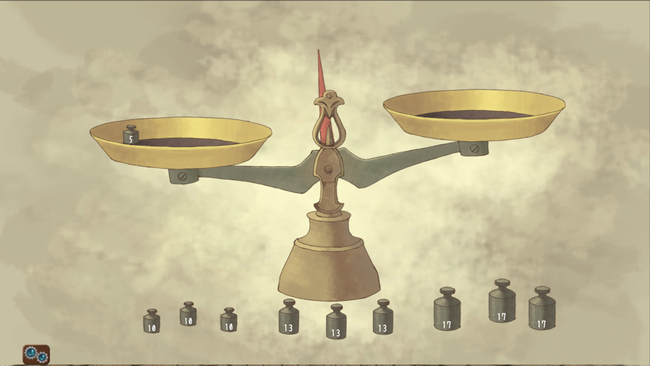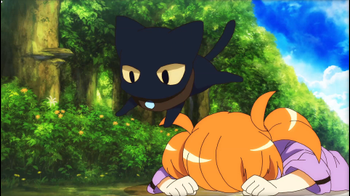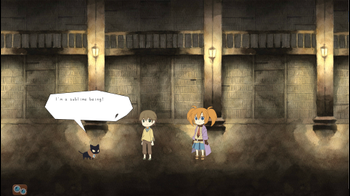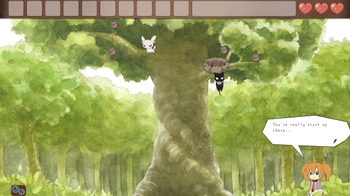
Resette's Prescription ~Book of Memory, Swaying Scale~ Review
Sekai Project has done an incredible job when it comes to introducing unique experiences to my library. Resette’s Prescription is not something I would have typically picked up on my own, as I rarely find myself entertained by the point-and-click style of gameplay. However, Liz-Arts captures the charm of a children’s book in their short new adventure, and Sekai Project has certainly added another unexpected gem to my collection.
Resette, along with her feline companion, Gaede, begin their adventure stumbling through unfamiliar woods. Clearly lost, the two bicker over their circumstances, but these interactions between Resette and Gaede make for some of the more delightful moments in the game.
Their dynamic balances each other out well. At one point, Gaede comments on a less than ideal situation involving another character’s mother. He’s a little harsh, perhaps even too cruel with his comments, while Resette makes an emotional plea to understand the other side. This back and forth happens a few times, never allowing the pendulum to sway too far in one direction as they bicker.
The friendship observed between Resette and Gaede is only one part of Liz-Arts’ tale. The core of this game is its story, and in the span of four hours it manages to hit a few high notes that games double that length never get close to.
After a confusing encounter, Resette finds herself entering the mind of a boy, Achille, whose troubled past is preventing him from waking up out of a deep slumber. Accompanied by Gaede, Resette ventures into a town within the boy's mind.This is a place that relies so heavily on a set of rules and social order that it's creating a toxicity rotting the town from the inside out.
As things crumble, the two learn that this court upholding absolute virtue rules without empathy. Nothing in this town is considered on a case-by-case basis, making their court hearings something more of a spectacle instead of necessity. The judge never concerns himself with the circumstances of each supposed criminal, as all individuals will be punished the same.
This is the crux of the story, and where Resette and Gaede begin to unravel just what went wrong in Achille’s troubled past. What felt most surprising about how things unwind is the darker nature of the tale, something I wasn’t expecting from a children’s book atmosphere. While the tones don’t seem to match in that respect, the subject matter Resette’s Prescription takes on captured my attention and held it there.
The way everything unfolded demanded I try to beat Resette's Prescription in a single play through, not impossible given the length of the game. This was to the title’s advantage, as it did unfortunately stumble ever so slightly in other areas.
Since Resette’s Prescription relies heavily on its story for value, it’s forgivable that the gameplay is rather straightforward and basic. It plays like a typical, older point-and-click adventure and takes no risks on changing that formula.
At no point did I desire much more from it, aside from the removal of some poorly placed heart containers in the corner of the screen. They seemed a little misleading, as if there were elements of the game that could actually cause damage when that simply wasn’t the case. I purposefully clicked around things I assumed may be harmful just to see if they had some sort of purpose, but it seems like they aren’t utilized until the very end with an oddly placed boss fight. If the health bar wasn't going to be used until five minutes before the end, I would have much preferred it appear then.
This fight was the only thing that felt severely out of place in Resette’s Prescription. It seemed shoehorned into the end, becoming something incredibly unnecessary. Up until that point I enjoyed the game in a nearly flawless play through. When everything stopped for this cumbersome fight, I was a little disappointed.
For a few hours prior, Resette’s Prescription was full of clever puzzles that took me a few minutes on each to piece together. These were some of the elements that gave it a unique identity, and the game would have been better served to end on a similar note. In this aspect, the experience suffers where many others have as well. A boss fight does not give validity to a game's existence as a game. The tools Resette's Prescription relies upon to tell its story are enough to validate its existence in the medium. It does not need to rely upon tired game design devices, like boss fights, to reaffirm its identity.
Liz-Arts demonstrates they’re completely capable of an interesting puzzle or two. Axe the boss fight and heart containers, then allow for another artful setup to serve as the finale. This would have made for a much more enjoyable experience when all was said and done.

Resette’s Prescription benefits from its endearing art style and ability to tell a meaningful story in its limited time. I could talk all day and expand upon why the game nails nearly a perfect formula for chronicling the adventures of Resette and her ornery companion, but would do so at the risk of spoiling how it unfolds. Regardless of the times it faltered, Resette’s Prescription ~Book of Memory, Swaying Scale~ is still something I would insist is well worth the time dedicated to it.


